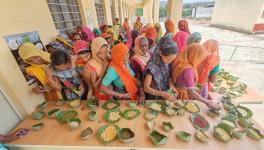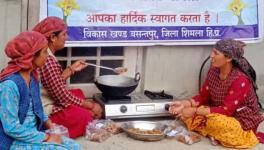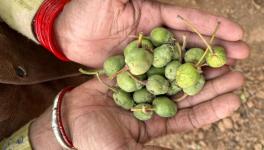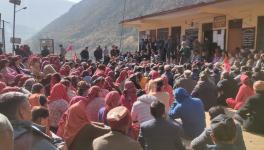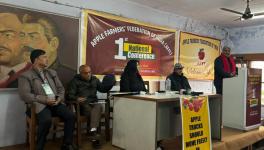HP: Shalkhar Model of Sustainable Agriculture is a Blend of Science, Spirituality
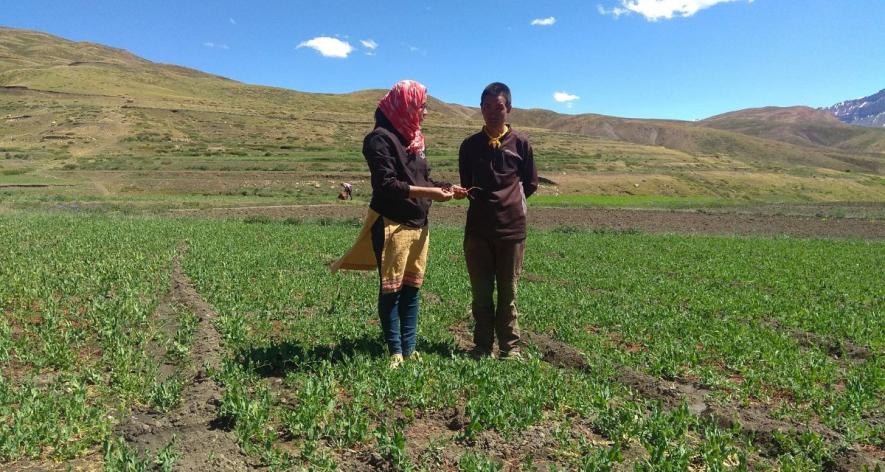
A young farmer being taught about natural farming by BTM. Image Credit: Sujata Negi
Shimla, Himachal Pradesh: Across the country, governments have been pushing for more sustainable farming practices, but it has always been a challenge to raise awareness and convince people. In the remote tribal village of Shalkhar in Kinnaur district of Himachal Pradesh, the shift to sustainable farming happened very differently as the villagers unanimously decided to stop using pesticides and adopt natural farming in 2016.
The transition, however, was not an overnight process. It involved years of consistency, strict adherence to community-led rules, and complete dedication to the cause.
"The discussion about banning chemical fertilisers began way back in 2011, but it took over five years for the whole village to finally agree on it. Taking that final step was difficult as the livelihood of villagers was dependent on agriculture," villager Ram Gopal Negi (34) explained.
The villagers who belong to Kinnauri tribe started this conversation after being consistently exhorted by TK Lochen Tulku Rinpoche, a spiritual teacher in Buddhism, during his annual spiritual visits to the village. The village panchayat was also in favour of a ban on chemical fertilisers and pesticides. The government started promoting natural farming in the area only in 2018.
“Rinpoche never made it mandatory. It was in 2008-09 that he started requesting people not to use pesticides and chemical fertilisers as they were affecting the environment and soil. Adding a spiritual angle to it, he stated that there are many organisms in the air, which we kill while spraying pesticides, which is a sin. This spiritual guidance helped the villagers understand the broader consequences of their actions,” village pradhan Suman Negi (30) told 101Reporters.
Asked why he chose Shalkhar village, Rinpoche explained, "I am from this village. I was born here. Before attempting to change anything outside, I first need to change my home. This is why I focused on Shalkhar. I noticed that people were using many chemical fertilisers, which were deteriorating the health of the environment. Moreover, they were not benefiting financially from it." He added that people were kind enough to listen to him.
However, it was only in 2011 that people really took note of what Rinpoche advocated. In 2016, the chemical ban was imposed, with Rs 25,000 fine to be paid by those defying it. “So far, nobody has broken this rule," Suman said.
The change was not easy as the whole village was dependent on agricultural income. The difficulties for the village began immediately after the ban on fertilisers. "Since the apple trees were accustomed to spraying chemicals, we saw a sudden rise in mites and woolly aphids. Apple production dropped by up to 80%. In fact, to cope with the financial crisis, people here sought work as road construction labourers with the Border Road Organisation [BRO],” she narrated.
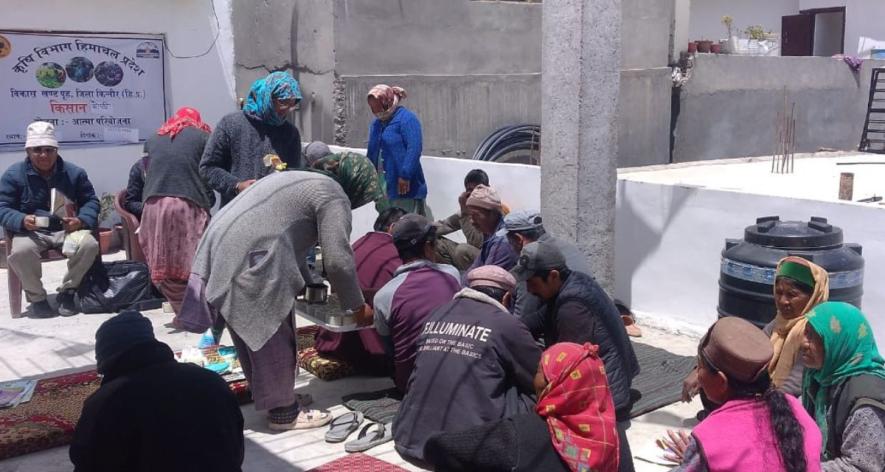
Women and other villagers being trained at Shalkhar village in Himachal Pradesh. Image Credit: Gaurav Negi
Manoj Kumar Negi (45), a farmer from Shalkhar, told 101Reporters that he is the sole breadwinner of his seven-member family. “Before the ban, I used to produce around 200 boxes of apples, besides pea, cauliflower and potatoes.
After the ban, I barely got 20 boxes of apples, many of which were damaged,” he said.
Manoj had no option but to work for Rs 433 a day with the BRO. Despite earning nearly Rs 13,000 per month, he struggled to meet the financial needs, including the educational expenses of his children. “I somehow managed in those initial days of shift. Today, our financial condition has improved. My children study in Shimla and Solan, with all expenses covered by farm income,” Manoj added.
He also stated that after quitting pesticides, farm work has significantly reduced as there is no spraying to control diseases.
Government Accelerates the Shift
Ritesh Kumar Gupta, Project Director, Reckong Peo, Kinnaur, told 101Reporters that the village was adopted by the agriculture department under the natural farming practices and developed as a model village, as part of its first phase of natural farming expansion in the state.
“The district is blessed with good climate, so there were not many pesticides in use here compared to other parts of Himachal. Many diseases are not seen here due to the cold conditions. When the department adopted the village, they had already abandoned chemical fertilisers, but were dealing with production and disease-related issues,” he said.
The department made them aware of the principles of natural farming, which means not eliminating any organism from the food chain but managing it within the limited capacity. “Since then, we have provided 89 training sessions for 3,120 farmers, of which 1,006 are active farmers who have cultivated around 273.2 hectares of land across Pooh block. Apart from apples, people are cultivating pea, rajma [kidney beans], barley, potatoes, and stone fruits, which are also cash crops," Gupta explained.
In the training sessions, agricultural field staff taught farmers how to make ghanjeevamrit, jeevamrit and beejamrit. Experts visited the village to demonstrate techniques. Gradually, the village fields saw the shift. Now, the whole village has organic and natural farming certifications.
According to Ram Gopal, Block Technology Manager (BTM) used to visit every 20 days, and was always available on phone.
Blending science with tradition, the community also performs a special smoke ritual of sur as suggested by the Rinpoche. The ritual involved mixing sattu (roasted flour), ghee, sugar and some local aromatic herbs, which were burnt to create smoke. This smoke was thought to purify the atmosphere and ward off harmful pests that might otherwise destroy the crops.
When asked why he encouraged the use of sur, the Rinpoche explained that its spiritual importance was undeniable. "I do not know the scientific principles. All I know is that sur, which contains local herbs [shompaa], ghee, roasted flour and other ingredients, works in pest control. Just as burning cow dung keeps mosquitoes away, sur works to cleanse the environment," he claimed.
To promote the village and natural produce, the government has established the Ratan Bhadurpur Farmer Producer Company (FPC), which has formed ties with multiple companies to sell apples. However, Deewan Negi (37), an apple grower, claimed that the company does not pay them a higher amount for natural produce. He also stated that marketing is one of the challenges they face, so they are thinking of taking up this matter with the state government. However, he agreed that the village is earning more than before.
Confirming that the prices are the same, FPC chairman Ram Gopal said, “Nearby villages of Chango and Hurling have now started natural farming, but we have been doing it for some time. Still, they sold their crops for Rs 1,100 per box, and so did farmers of Shalkhar. Here, instead of giving crops to the FPO, farmers often sell to local contractors, who quote a single price and take the crops directly from the fields. Farmers generally prefer this because it reduces labour and transportation costs. We have been taking up the matter with the government, but no concrete solution has been reached yet. So, we are unable to market our produce the way it should be.”
Replicating Good Work
Inspired by the success in Shalkhar, nearby villages of Hurling, Sumra, Chango, Nakoo, Tabo and others have adopted natural farming techniques. In fact, Hurling village has even set up a checkpoint to prevent pesticides from being brought into the village. While productivity has not been affected much except for the initial transition time, people noticed that the overall health of crops and trees have improved.
Sujata Negi, who herself is a passionate farmer and BTM trainer from the Spiti Valley, said that to inspire people, local monasteries mostly reject chemically grown fruits and vegetables as offerings. She pointed out that their decision to pursue natural farming was not merely spiritually motivated, even though spiritual factors played a strong role in it.
The farmers also contacted the horticulture department to deal with the challenges. They learned about current issues, like water scarcity and water-conserving farming practices in the region due to scarce resources. Drought tolerant black peas became predominant. Another widely adopted practice was multi-cropping, where diverse crop varieties were grown together on the same farm to make full use of their resources and ensure less risk at once.
Sujata elaborated on how, inspired by the Shalkhar model, Yeshey Dolma from Lidang in Spiti Kaza formed a group of 20 women farmers to collectively cultivate 80 bighas of land using natural farming practices. Yeshey manages 25 bighas of irrigated land, producing peas, cabbage, cauliflower, broccoli and potatoes, apart from all the conventional cereal crops such as barley and kala matar. She also rears local cattle, including jomo, bashi, churu and yak. All her farming work is supplemented by her family members — her husband who is a senior secondary school teacher, three sons and a daughter — while she has equipment such as a power trailer and tractor.
Rachna Verma is a freelance journalist and a member of 101Reporters, a pan-India network of grassroots reporters.
Get the latest reports & analysis with people's perspective on Protests, movements & deep analytical videos, discussions of the current affairs in your Telegram app. Subscribe to NewsClick's Telegram channel & get Real-Time updates on stories, as they get published on our website.









